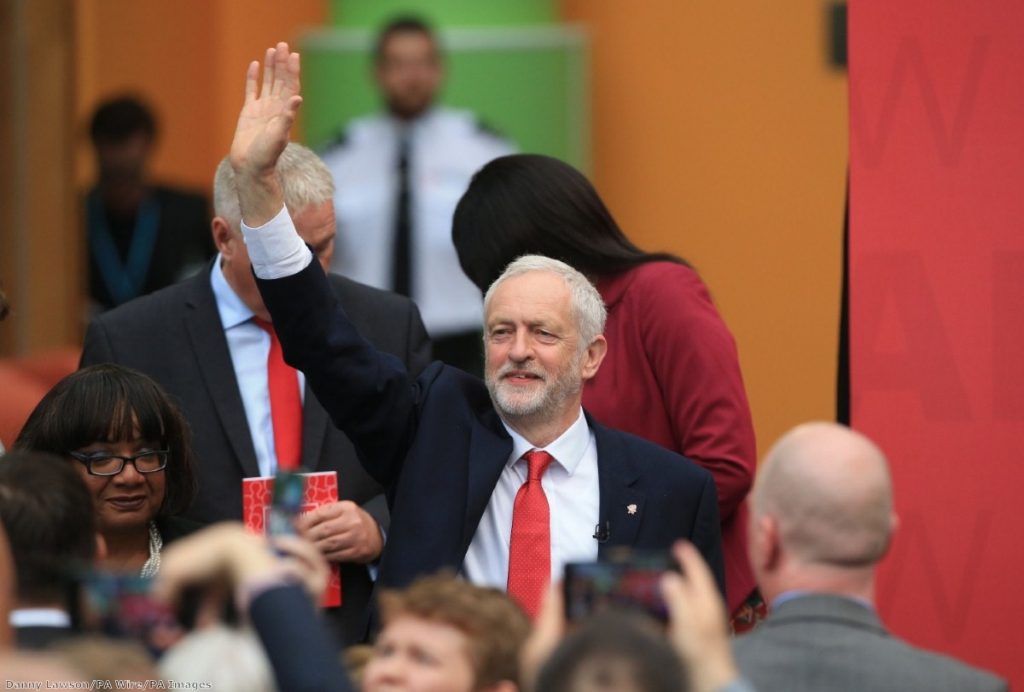There are loads of good immigration policies in Labour's manifesto. The party rejects any bogus immigration target, it commits to an end to indefinite detention without charge, it pledges to end the brutal £18,600 income benchmark on those trying to bring their husbands or wives to Britain, it deals with the modern slavery of visas connected to the employment of domestic workers and it says it'll help the refugees who flee war and persecution. It's a good, compassionate, liberal, civilised set of proposals, which pays particular attention to issues which get little coverage in the mainstream press but inflict terrible cruelty on British citizens and immigrants alike. Good on them.
But when you get to freedom of movement, something interesting happens. "Freedom of movement will end when we leave the European Union," the manifesto says. That sounds like a statement of plain fact, but it is actually simultaneously very revealing and misleading.
Just a few weeks ago, Brexit secretary Keir Starmer was saying something subtly different. He was still planning to get rid of free movement, but he hoped to do so as part of a negotiation which involved staying in the single market. The policy seemed to be that Labour would only countenance leaving the single market once it was clear free movement could not be reformed.


"Unchanged single market membership is not a viable option," he said, "but we would want to leave the options on the table to discuss with our European colleagues what the appetite for change and revision and reform of single market rules [is]." Theresa May, on the other hand, had "taken all options off the table before she starts".
In the manifesto, this is translated into the de-facto statement that free movement ends when we leave the EU. There is no mention at all of trying to stay in the single market by reforming it. The text appears to contort two things in precisely the way Theresa May once did – EU membership and single market membership. You can chose to leave the first without leaving the second. That's not what we're doing, but let's be clear: that is a choice. It does not necessarily follow from the Brexit referendum mandate.
It's possible that the wording is slippery in that section, so it's worth looking at the rest of the Labour manifesto to see if it envisages staying in the single market, under any conditions.
It doesn't get us very far. The manifesto pledges a white paper on how Labour would go about "retaining the benefits of the single market". That implicitly suggests we'd be out the single market. On agriculture, it promises to help farmers "by securing continued EU market access". Again, that implicitly assumes we don't have membership.
It's clear that Labour wants to leave the single market, this time with no caveats and no attempt to renegotiate membership beforehand. That's hardly surprising. After all, Corbyn has no problem with free movement. It's specifically the single market – and most importantly the state aid rules it contains – which he objects to. Corbyn's office seems to have won the tug of war with Starmer.
This fight has been going on in Labour for some time. Right after the referendum, some Labour MPs demanded that we stay in the single market no matter what, some demanded that we try to stay in the single market by reforming free movement but that we leave if we can't, and some argued that we leave the single market no matter what. Starmer started out in the first camp. After conversations with Labour MPs in northern seats he switched to the second position – one which he held as recently as late April. But now the party is in the third camp. We should presume that this is the camp Corbyn has been in throughout, although he has never been willing to actually say so.

The manifesto then goes on to promise to protect workers' rights, environmental standards, consumer protections and the rest. It is absurd. The best way to do that is to stay in the single market. It goes on to demand a solution to the dangerous problem of a border in Ireland. The best way to do that is to stay in the single market. It says it wants to put jobs and the economy first. The best way to do that is to stay in the single market. But that is something Labour has chosen not to do.
In truth, Corbyn's Brexit proposals are even more misleading than May's. At least the prime minister is now willing to say clearly and plainly that she's not staying in, even if it did take her months. Corbyn is still playing this infuriating softly-softly approach where he refuses to actually say what his policy is.
Leaving the single market is one of the most risky economic decisions a British government has undertaken in the modern era. The least the public deserves is for a party to state explicitly that that is the policy it is pursuing.
But regardless of clarity, today was the day that Labour made it clear, without any doubt whatsoever, it supports hard Brexit.
Ian Dunt is the editor of Politics.co.uk. His book – Brexit: What The Hell Happens Now? – is available now from Canbury Press.
The opinions in politics.co.uk's Comment and Analysis section are those of the author and are no reflection of the views of the website or its owners.










